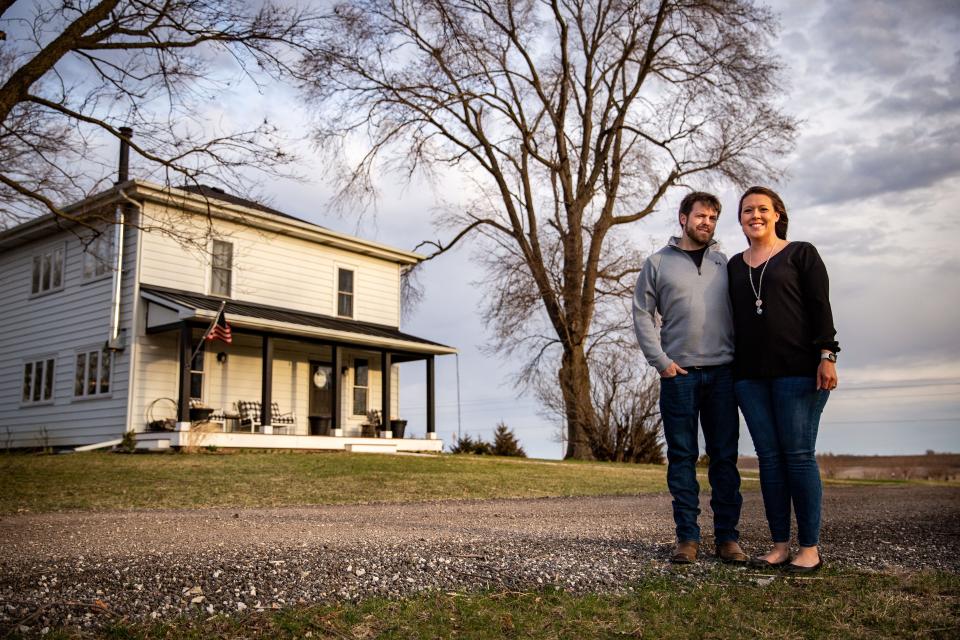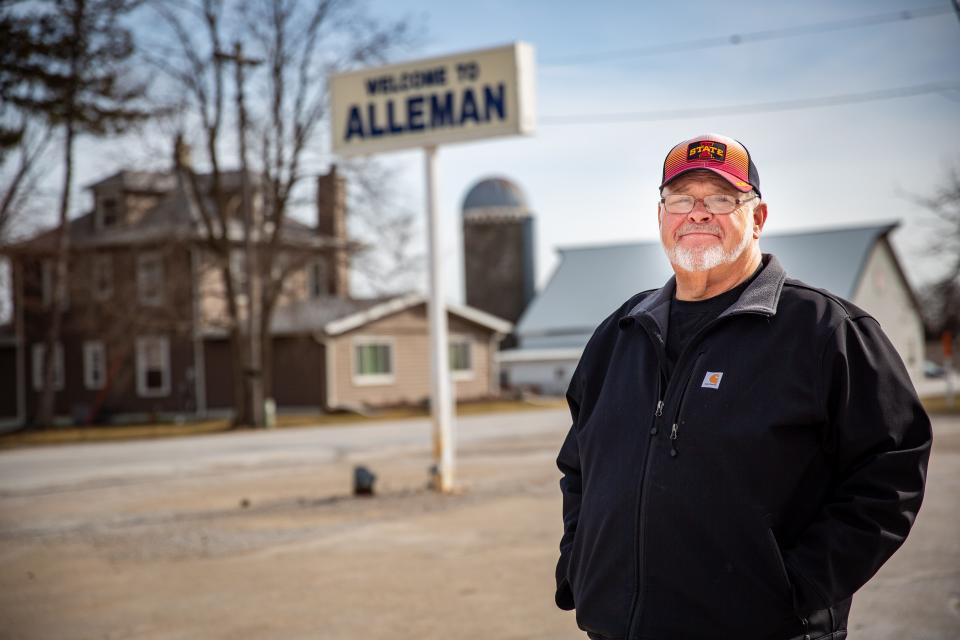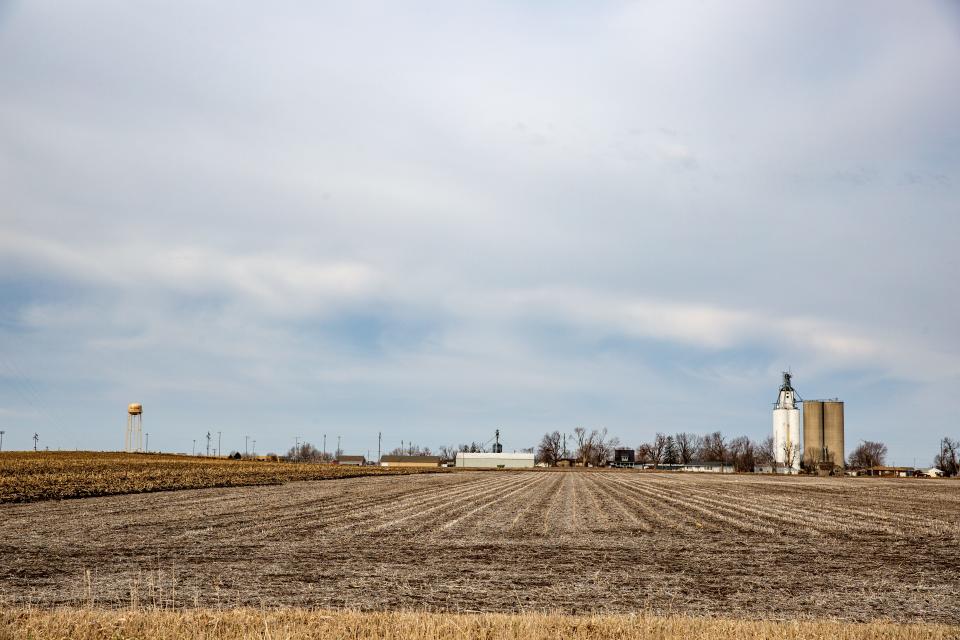Iowa state board approves controversial Ankeny annexation that neighbors, Alleman strongly opposed
A state board approved a plan on Wednesday that will bring hundreds of acres into Ankeny's city limits over the objections of rural homeowners who want to keep their land outside of the surging suburb.
After a 100-minute public hearing, the city development board unanimously signed off on the plan, which will add 585 acres of prime real estate to Ankeny's northeast side in an area about to burst with residential and commercial development. Most of the land, which is near Interstate 35, is owned by developers, who agreed to become part of Ankeny alongside residential owners with smaller properties.
However, some of the other homesteaders did not agree — totaling about 4% of the land involved — and are concerned about how going out of the county and into the city of Ankeny will impact their taxes and their lifestyles. In Iowa, cities can take in properties without the owner's consent so they can follow a state law that discourages irregular borders and prohibits "islands" of county land that would be surrounded by cities.
More: As Ankeny's growth surges north, could rural Polk County homeowners stand in the way?
Ultimately, that's why the board approved the plan. Eric Jensen, director of community development for Ankeny, said the city is following the state's direction on borders and islands, and that the city has planned for growth in the area so it would be ready to provide services.
"I do want to tell you that we did hear you, but we have to go with what the code says," said board member Mari Bunney.
A group of acreage homeowners in rural Polk County, like the Grove and Seuntjens families, organized to oppose the annexation. They have said that they knew development was coming their way, but they did not realize that they could be forced into Ankeny's city limits.

They are worried about what might happen if neighbors start complaining about the way they use their properties, or if they brush up against city ordinances when they shoot firearms, keep the grass growing long, take the dune buggy out for a spin or have friends camp out for a backyard party. There are also potential costs, like needing to pave their long driveways for six figures with certain construction projects.
"Being annexed into Ankeny is going to change my life," said property owner Chris Seuntjens. Other nearby property owners, like the Wattonvilles of Wattonville Family Farm, fear they could be next as agricultural land disappears to make way for suburban growth.
Officials in nearby small city of Alleman also strenuously objected, with concerns about how future Ankeny growth could affect its roads and their own future plans for development, which would be smaller-scale for the rural community.
However, not all of the smaller property owners were against becoming part of Ankeny, which brings benefits like more access to city services and infrastructure — on top of the big bucks they could get if they sell.
More: Altoona wants to expand its borders to the northwest. What could be built there?
Board Chair Dennis Plautz said the city of Ankeny should figure out a way to better resolve these kinds of issues when they come up, and also said that Alleman has run into the problem of some of them not being dealt with years ago.
Jeanne Uhl, a homeowner who did agree to join Ankeny and who used to be the city clerk for nearby, fast-growing Elkhart, suggested that Alleman did not do a good job of planning for its future growth and infrastructure needs.
What did Alleman want to happen?
Officials in the city of Alleman, which is to the north and has about 420 people to Ankeny's 70,000, heavily objected to the Ankeny annexation. Alleman is the home of the North Polk school district, and Mayor Bob Kramme has said that continued suburban growth in surrounding cities is bringing in school traffic that is tearing up the roads and straining the city's financial ability to fix them on their own.
The annexation has revealed a rift between officials in Ankeny and Alleman.

Kramme has lobbied property owners and intended to set up a competing annexation plan covering much of the same land, where Alleman would snag some of the prime land by the interstate instead. Alleman had three goals: to free up land to develop on its own, smaller-scale terms; preserve more agricultural land for area farmers; and block Ankeny's march north.
In the end, only an Ankeny proposal came before the city development board on Wednesday. Kramme said that Alleman's recent plan fell apart at the last minute after a property owner pulled out.
Plautz noted the unusual situation Alleman is in, saying that he's never heard of a city objecting to an annexation for these reasons.
Bill Kimberley, who has long-time connections to the area and is poised to develop much of the land involved, said this area is prime for large-scale commercial and light industrial development alongside residential or even warehouses — things that will provide tax dollars and jobs — and that's why he bought the land.

He said he has nothing against Alleman, and understands the city's predicament, but he said that he can't buy the land and try to develop it with a septic sewer system like the one Alleman uses, compared to Ankeny's heavy-duty sewer infrastructure, or the other services Alleman doesn't provide. Kimberley also said he understands the concerns of the property owners.
Board members said it was not their role to resolve local issues or conflicts between cities, but instead follow the planning principles outlined in the law that seek to avoid irregular borders and islands.
Chris Higgins covers the eastern suburbs for the Register. Reach him at chiggins@registermedia.com or 515-423-5146 and follow him on Twitter @chris_higgins_.
This article originally appeared on Des Moines Register: Will Ankeny's growth continue northeast over Alleman's objections?

